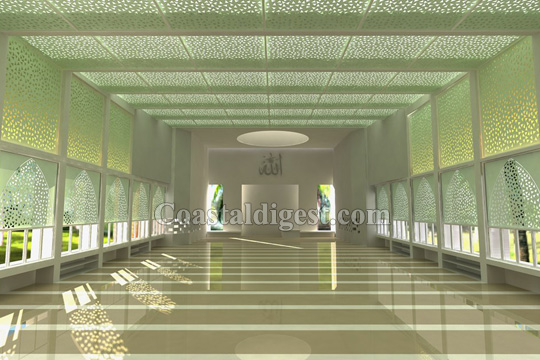Hounde, Jul 28: Coronavirus and its restrictions are pushing already hungry communities over the edge, killing an estimated 10,000 more young children a month as meager farms are cut off from markets and villages are isolated from food and medical aid, the United Nations warned Monday.
In the call to action shared with The Associated Press ahead of publication, four UN agencies warned that growing malnutrition would have long-term consequences, transforming individual tragedies into a generational catastrophe.
Hunger is already stalking Haboue Solange Boue, an infant from Burkina Faso who lost half her former body weight of 5.5 pounds (2.5 kilograms) in just a month. Coronavirus restrictions closed the markets, and her family sold fewer vegetables. Her mother was too malnourished to nurse.
“My child,” Danssanin Lanizou whispered, choking back tears as she unwrapped a blanket to reveal her baby's protruding ribs.
More than 550,000 additional children each month are being struck by what is called wasting, according to the UN — malnutrition that manifests in spindly limbs and distended bellies. Over a year, that's up 6.7 million from last year's total of 47 million. Wasting and stunting can permanently damage children physically and mentally.
“The food security effects of the COVID crisis are going to reflect many years from now,” said Dr. Francesco Branca, the WHO head of nutrition. “There is going to be a societal effect.”
From Latin America to South Asia to sub-Saharan Africa, more poor families than ever are staring down a future without enough food.
In April, World Food Program head David Beasley warned that the coronavirus economy would cause global famines “of biblical proportions” this year. There are different stages of what is known as food insecurity; famine is officially declared when, along with other measures, 30% of the population suffers from wasting.
The World Food Program estimated in February that one Venezuelan in three was already going hungry, as inflation rendered salaries nearly worthless and forced millions to flee abroad. Then the virus arrived.
“Every day we receive a malnourished child,” said Dr. Francisco Nieto, who works in a hospital in the border state of Tachira.
In May, Nieto recalled, after two months of quarantine, 18-month-old twins arrived with bodies bloated from malnutrition. The children's mother was jobless and living with her own mother. She told the doctor she fed them only a simple drink made with boiled bananas.
“Not even a cracker? Some chicken?” he asked.
“Nothing,” the children's grandmother responded. By the time the doctor saw them, it was too late: One boy died eight days later.
The leaders of four international agencies — the World Health Organization, UNICEF, the World Food Program and the Food and Agriculture Organization — have called for at least dollar 2.4 billion immediately to address global hunger.
But even more than lack of money, restrictions on movement have prevented families from seeking treatment, said Victor Aguayo, the head of UNICEF's nutrition program.
“By having schools closed, by having primary health care services disrupted, by having nutritional programs dysfunctional, we are also creating harm,” Aguayo said. He cited as an example the near-global suspension of Vitamin A supplements, which are a crucial way to bolster developing immune systems.
In Afghanistan, movement restrictions prevent families from bringing their malnourished children to hospitals for food and aid just when they need it most. The Indira Gandhi hospital in the capital, Kabul, has seen only three or four malnourished children, said specialist Nematullah Amiri. Last year, there were 10 times as many.
Because the children don't come in, there's no way to know for certain the scale of the problem, but a recent study by Johns Hopkins University indicated an additional 13,000 Afghans younger than 5 could die.
Afghanistan is now in a red zone of hunger, with severe childhood malnutrition spiking from 690,000 in January to 780,000 — a 13% increase, according to UNICEF.
In Yemen, restrictions on movement have blocked aid distribution, along with the stalling of salaries and price hikes. The Arab world's poorest country is suffering further from a fall in remittances and a drop in funding from humanitarian agencies.
Yemen is now on the brink of famine, according to the Famine Early Warning Systems Network, which uses surveys, satellite data and weather mapping to pinpoint places most in need.
Some of the worst hunger still occurs in sub-Saharan Africa. In Sudan, 9.6 million people live from one meal to the next — a 65% increase from the same time last year.
Lockdowns across Sudanese provinces, as around the world, have dried up work and incomes for millions. With inflation hitting 136%, prices for basic goods have more than tripled.
“It has never been easy but now we are starving, eating grass, weeds, just plants from the earth,” said Ibrahim Youssef, director of the Kalma camp for internally displaced people in war-ravaged south Darfur.
Adam Haroun, an official in the Krinding camp in west Darfur, recorded nine deaths linked with malnutrition, otherwise a rare occurrence, over the past two months — five newborns and four older adults, he said.
Before the pandemic and lockdown, the Abdullah family ate three meals a day, sometimes with bread, or they'd add butter to porridge. Now they are down to just one meal of “millet porridge” — water mixed with grain. Zakaria Yehia Abdullah, a farmer now at Krinding, said the hunger is showing “in my children's faces.”
“I don't have the basics I need to survive,” said the 67-year-old, who who hasn't worked the fields since April. “That means the 10 people counting on me can't survive either.”









Comments
Congratulatios for this ingenious concept and indeed it is a great leap forward
CONGRATULATIONS FOR THE ACHIEVEMENT AND INDEED IT IS A GREAT LEAP FORWARD
Assalamualaikum. My heartiest congratulations to Syed Mohamed Beary for this wonderful achievement, I also congratulate the architects and the whole team of Beary's Goup.
May Allah give abundance barakah and good health to all.
I request Mr Beary to build a eco friendly masjid in bangalore as well.
Heartiest congratulations to Mr Syed Beary and his wonderful team for this great idea and achievement. Every effort to save this planet is welcome and is appreciated. Let us hope this noble venture will set the tone for many more such constructions in future.
Heartiest Congratulations to Mr Syed Beary and his wonderful team for a great achievement. Hope this will set the trend for many such Eco- friendly buildings in future. Every effort to preserve this earth is to be greatly appreciated.
Masha Allah Thabarakallah!!!
May Allah protect it from all evils in the society.
Sir syed Beary, you have indeed come up with the innovative concept. may Allah bless u. I would like to request about saving water energy too especially Ablution section in masjids. Our Prophet(saws)was finishing his ablution with 1 small mug but majority of us needs litres of water. So implement some sensor system ablution area.
We as a muslim community are lacking Islamic marriage hall in mangalore. Hall with prayer room, separate seating for gents and ladies. In other halls we need partition. Please include this concept in near future.
May Allah reward you with his immense blessings.
Everything is green. What about deen
Is it like what Rasool SA have left to ummah and the sahabah RA followed or is it like the corrected musliyars teach.
May Allah guide us as he guided the Sahabha
Masha Allah. May Almighty Allah accepts the work and give them the reward of Jannah. MAN BANAA MASJIDAN LILLAH BANALLAHU LAHU BAITHAN FIL JANNAH. HADITH.
Keep going \Bearys\"....Best of luck."
\MASHA ALLAH\" Beautiful Masjid"
Appreciate.this.Symbolic Move.
Well.Done.Bearys Group
Even.for.Ablution.Prophet SallallahuAlaihiWasallam
Said..not.to.waste.Water
Green Is the.concept.of.the.Deen
Green.in.Character
Green.in.Relationships
Green.In.construction
Green in contribution
Green.in.Harmony and Peace.
Green in.Environment.and.atmosphere..
Happy To. See it in.action.from.Bearys.Group
While.International Summits people.Talk
Here you.Guys Do.Walk.the.Talk.
Appreciate.from.Bottom.of.the. Heart Once again
# Mohammed Rifay # Green.Mosque# Go.Green Bearys
Masha Allah...Mubarak
Wonderful Achievement
Dear All...... Masjids are already Eco friendly. as no part of our worship is included in environmental pollution . difference is power now is eco friendly
Nice to see concept
Masha Allah,
Masha Allah. Thank you Bearys for beautifying our town. I hope women also will be allowed to enter and offer prayer in this mosque. our Probhet has not allowed any MAN to prevent entering the women into mosque.
Really appreciable initiative. In fact Muslims elite should concentrate more on innovating mosque and thereby spreading the message of Islam to non Muslims. Mosque should not be confined to prayers. It should be islamic centre and hidaya centre. There should be exclusive facitlty for non muslims (who want to know about Islam) in mosques.
Masha Allah. Nice to read this report. really impressive.
A wonderful concept. May Allah give long life and immense reward for Beary's group founder Syed Beary sab for this wonderful work. He is a jewel in the community.
Good initiative. Lesson for Hindus too. We should convert all temples and mutts into eco friendly and noise-less buildings. All the best brothers!
Add new comment